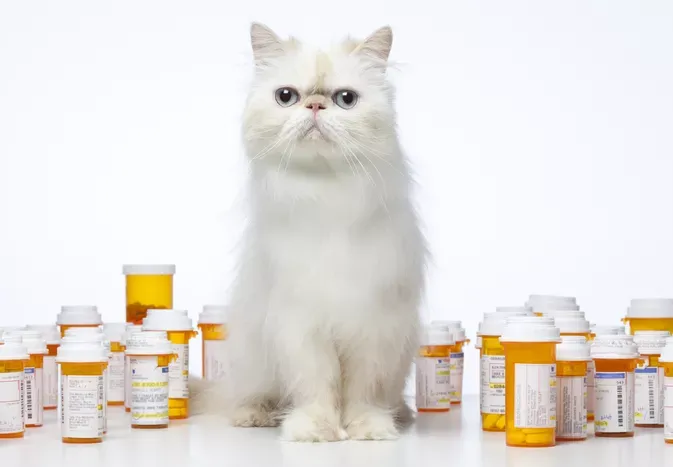Using Pimobendan (Vetmedin) for Cats with Heart Failure
Updated on 05/26/24

Unlocking the Power of Pimobendan (Vetmedin) for Cats with Heart Failure
Heart failure, a debilitating condition that affects countless feline companions, can be a disheartening diagnosis for both cats and their owners. However, significant advancements in veterinary medicine have introduced novel therapeutic approaches, such as pimobendan (Vetmedin), that offer renewed hope in managing this disease.
Understanding Heart Failure in Cats
Heart failure occurs when the heart's ability to pump blood effectively diminishes, causing fluid accumulation in the lungs (pulmonary edema) or other organs. In cats, the most common cause of heart failure is hypertrophic cardiomyopathy (HCM), a condition characterized by abnormal thickening of the heart muscle.
Symptoms of Heart Failure in Cats
Early detection is crucial for effective management of heart failure. Common symptoms to watch for include:
* Difficulty breathing (dyspnea)
* Persistent coughing
* Rapid heart rate (tachycardia)
* Irregular heartbeat (arrhythmia)
* Decreased appetite and weight loss
* Lethargy and weakness
Pimobendan: A Proven Ally against Heart Failure
Pimobendan, marketed under the brand name Vetmedin, is a revolutionary medication that has transformed the treatment of heart failure in cats. This innovative drug works by:
* Enhancing contractility: Pimobendan increases the force of heart contractions, improving blood flow to vital organs.
* Dilating blood vessels: It relaxes blood vessels, reducing afterload (resistance against which the heart pumps) and improving cardiac output.
Clinical Benefits of Pimobendan for Cats with Heart Failure
Numerous clinical studies have demonstrated the significant benefits of pimobendan in feline heart failure patients, including:
* Improved survival rates: Cats treated with pimobendan experience longer and healthier lives.
* Reduced symptoms: The drug effectively alleviates shortness of breath, coughing, and other symptoms associated with heart failure.
* Enhanced quality of life: Pimobendan improves cats' overall well-being, enabling them to enjoy a more active and fulfilling life.
Examples of Successful Pimobendan Use in Cats with Heart Failure
Countless feline companions have experienced remarkable improvements in their condition thanks to pimobendan. Here are a few inspiring examples:
* Molly, the Brave: Molly, a 12-year-old domestic shorthair cat with HCM, was struggling with severe respiratory distress. Pimobendan therapy dramatically reduced her coughing and improved her breathing, allowing her to enjoy life once again.
* Max, the Mighty: Max, a 9-year-old Maine Coon with dilated cardiomyopathy (DCM), was facing a bleak prognosis. After starting pimobendan, Max's heart function improved significantly, enabling him to live an active life for several more years.
* Whiskers, the Wonder Cat: Whiskers, a 7-year-old Abyssinian cat with complex congenital heart disease, had been experiencing debilitating symptoms for years. Pimobendan therapy transformed her life, alleviating her breathing difficulties and increasing her energy levels.
Administering Pimobendan to Cats
Pimobendan is typically administered orally twice daily. The exact dosage will vary depending on the cat's individual needs, weight, and response to treatment. It is essential to follow the veterinarian's instructions carefully.
Potential Side Effects of Pimobendan
Like all medications, pimobendan has the potential for side effects, although these are generally rare. Some cats may experience mild gastrointestinal upset, such as vomiting or diarrhea. In very rare cases, pimobendan can cause arrhythmias or hypotension.
Monitoring for Optimal Results
Regular monitoring is crucial to ensure the effectiveness and safety of pimobendan therapy. Your veterinarian will recommend a schedule for:
* Physical examinations to assess overall health and response to treatment
* Chest radiographs to evaluate lung fluid and heart size
* Electrocardiograms (ECGs) to monitor heart rhythm
* Blood tests to check for any underlying conditions
Conclusion
Pimobendan (Vetmedin) is a powerful and well-tolerated medication that has revolutionized the management of heart failure in cats. With its proven ability to improve survival rates, alleviate symptoms, and enhance quality of life, pimobendan offers a beacon of hope for feline companions facing this challenging condition. By working closely with your veterinarian, you can harness the power of pimobendan to give your cat the best possible chance at a long and fulfilling life.
Explore More Pets

Cat Behavior Problems
How to Stop Aggression in Kittens

Long-Haired Cat Breeds
Siberian Cat: Breed Profile, Characteristics, & Care

Cat Behavior Problems
How to Stop Kittens From Scratching and Biting

Long-Haired Cat Breeds
Turkish Angora: Cat Breed Profile, Characteristics & Care

Basic Training
How to Socialize Your Kitten

Short-Haired Cat Breeds
Cute Pictures & Facts About Calico Cats & Kittens

Litter Box Training
Training Your Kitten to Use the Litter Box

Long-Haired Cat Breeds
10 Fun Facts About White Cats
